Name of student-owned boutique at the center of controversy
Photo courtesy of Brooke Adams
Brooke Adams posing in her boutiques clothes.
October 24, 2018
Editor’s note: Last spring, The JTAC published a story from a Tarleton student, Brooke Adams, in an attempt to highlight the work she is doing as an entrepreneur as owner of The Spunky Squaw. During the editorial process, The JTAC staff was unaware of the racist origin of the word “squaw.” At no point in the editorial process did The JTAC staff intend to use or publish a racial slur. The JTAC staff does not promote or endorse the use of the term “squaw” or the name of Adams boutique. The JTAC staff apologizes for the use of the word which we now understand is used to discriminate and marginalize the Native American community.
Tarleton State University senior Brooke Adams, has recently been surrounded by controversy over the name of her online boutique, The Spunky Squaw, which was featured in the Feb. 8. issue of The JTAC and later published on The JTAC website. This story can be found here. Within the past week however, both The JTAC and the university have been inundated with requests to have the article removed based on the derogatory and racial connotations of the term “squaw.”
“We are not a character, we are not a mascot,” said Yolanda Blue Horse, a Rosebud Sioux Tribal member and the co-founder of the Society of Native Nations. “Don’t use words like redskin, squaw, or brave. Don’t refer to us as those words. Those are belittling words to us, and when you use them to reference us.”
Adams said she has received thousands of messages regarding the name of her business. An online petition was also created urging her to change the name. As of Wednesday, there were more than 9,400 signatures. According to Adams, her choice of name for the store was never meant to offend people.
“When considering a name for my business I wanted something catchy but also strong and empowering. I considered several options and ultimately decided on the Spunky Squaw,” said Adams “I don’t really think of the name of the business being dissected into individual parts but more as a whole. Maybe even more like a feeling of strength like that of a female Native American. Not a specific origin or anything just a beautiful presence. I guess I have always been fascinated by the strength of the Native American people as a whole. The hardships they endured and still have such a strong culture despite that.”
Dakota Brant, the founder and CEO of Sapling & Flint, a clothing and accessory company tagged as an “indigenous brand designed for everyone” recognizes that the intent wasn’t malicious.
“(Adams) got up in the crossfire of something that’s already existing within the native American community in terms of a name change for years and years,” Brant said. “Unfortunately she’s been the recipient of backlash for something she didn’t really understand because she’s not a member of the indigenous community and because she doesn’t have people around her that are indigenous people who are helping her formulate an opinion.”
Brant however, does want Adams to listen to the concerns of others and change the name of her boutique.
“To me its tacky. She looks at Native American culture through a lens of a person who has no connection that culture whatsoever,” Brant said. “There’s a way you can incorporate native American culture in a good way. But using this word which does not represent what American Indian people are like is not one of those ways.”
On Oct. 15, Adams and her family began to receive a flood of messages through their social media accounts. According to Adams, most of these quotes were filled with insults and threats.
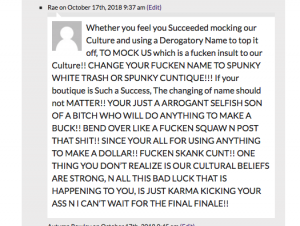

“I received death threats, extortion attempts, threats of violence like being raped, beaten, skinned from hundreds of people that stated the Indigenous Native American community,” said Adams. “Anyone that is associated with me has received the same types of vile tactics. All the while, these people continue to state they did this in the name of their views of how the name of my business offended them and defiled their women.”
Adams said this experience has made her think differently about the name of her business and confirmed she does plan to make some changes.
“I am currently in the process of planning the next steps for my business,” Adams said. “As stated before, I never intended to hurt anyone with my business name. Even though I know there was no ill intentions and do not agree with some people’s thoughts on The Spunky Squaw, I do recognize it is offensive to a significant amount of people. When going through thousands of messages there has been about 1 percent of the people expressing their concern and educating me which is why I am taking actions to turn this situation around. I do plan on coming up with another name for my business, however, it is not as quick of a process as most people assume that it is. I will continue to run my business as efficiently as possible through this difficult time.”
However, a name change is not the only change which advocates wish to change. On her website, Adams has a section called ‘Little Papoose’ which is a term used to identify Native American children and has used a Native American headdress in her advertisements.
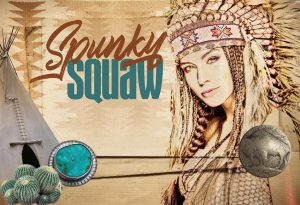
The original logo of The Spunky Squaw.
“A headdress, to us, is like a purple heart,” said Blue Horse. “Only those individuals which have been given that right are allowed to wear a headdress. The headdress is equivalent to a purple heart and it is not to be worn for costume purposes or in her case, advertisement. To use any of what is important to us, represents our cultural, represents us in our culture, is wrong.”




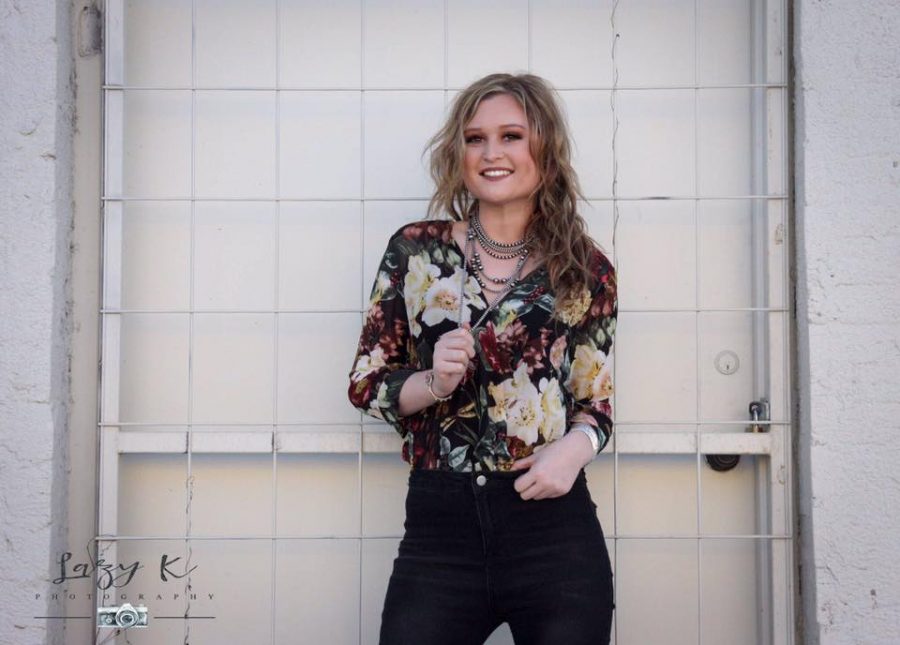
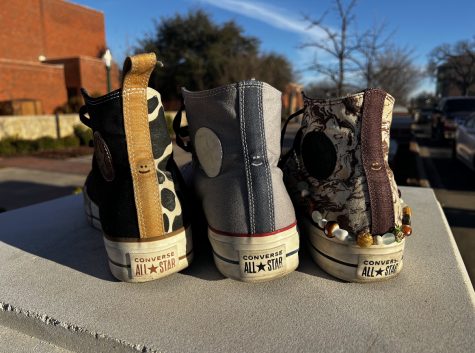
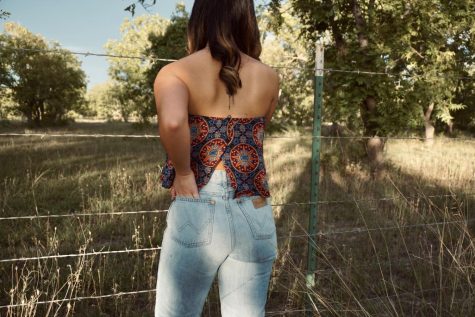
Cynthia Wynne • Nov 22, 2018 at 4:26 PM
After reading her reasons I think maybe that the indigenous history should be put in all institutes of education from primary to university to educate society. Brooke said herself she was unaware of this derogatory term because she was not educated, just my opinion
Wahine Toa • Oct 28, 2018 at 4:52 PM
The English word Squaw is an ethnic and sexual slur, historically used for Indigenous North American women. Contemporary use of the term, especially by non-Natives, is considered offensive, derogatory, misogynist and racist.
Wikipedia.
You all knew exactly what that word means, no one names their business without knowing the meaning of the name but you went even further by mimicking their cultural clothing in you business, so no matter how much you deny your racism, its Crystal Clear to the WORLD that you lot intended to defame the Soux Nation & those of the Natives of the Americas as an incitement to sexual attacks on native women & racial attack to the native peoples!
Khama comes around!
What you sow, you reap,!
For every action has an equal opposite reaction!
Turn from your sinful, lustful heart & turn to Jesus who can restore you from your sinful nature, call on Jesus to forgive you!
Robyn Carlson • Oct 27, 2018 at 11:56 PM
I think your company name is perfect. Squaw is an Algonquin word and it means cunt. You are certainly a cunt.
Goya • Oct 27, 2018 at 10:04 PM
Is this what comes rolling out of college these days?
Not only did a million people step up and tell this girl how wrong she is, for naming her cheap accessory boutique after a slur, her family AND “fans” stepped up and started using the slur in its original context, calling a group of angry women that protested the boutique name, a group of squaws.
Not only did they use the slur in its original context, they also used hate speech against the very people this prejudice is against.
She said she was sorry, but lied about death threats and feigns ignorance in this day and age. She should be sued by all the tribes in the Americas, for advocating hate speech and perpetuating racial prejudice.
Not only did her blood family call others Squaws but encouraged others to use the word.
I have a few choice words that are not printable, however I’d like to see why she thinks she’s being targeted, when she is in fact teaching others to be as ugly as her. Shame on her father. Shame on her family.
I feel sorry for her mother.
Becca • Oct 27, 2018 at 6:05 PM
Shame on you. Profiting off a slur. You sicken me.
Jo • Oct 27, 2018 at 8:26 AM
I am not native and even I knew what s***w meant. This woman is being willfully hurtful and ignorant. White people murdered the native peoples and tried to erase them from existence. It is so disturbing and disgusting that she is so woefully and again, willfully, ignorant that she would seriously wear an headdress with a shirt about whiskey…. White people used whiskey as one of their ways to eliminate native peoples.
Metis mommy • Oct 26, 2018 at 6:33 PM
As a Métis woman I’m disgusted that she stands behind her decisions I too am a university student the whole point of becoming a student is to open your mind. I don’t agree with death threats but she needs to read a book and be respectful my ancestors are not squaws they are not a fun look where you can just put on a head dress and mock my people. This is racism pure and simple and honestly I believe she should be held accountable.
Enraged Citizen • Oct 26, 2018 at 12:32 PM
If you think you woke up. Make a public apology, change the name, and reseach native artists so you can pay homage to them.
Michelle • Oct 26, 2018 at 12:20 PM
If you do a little research into the brand you can see that they are fully aware to what the word meant. There no were death threats, but thousands of people that are hurt trying to educate Brooke on the word. There was no remorse, but a very childish sense of pride. Every person that reached out to address the issue had been blocked. How can there be no harmful intent of the word when the brand called us a “lil sq*aw gang” and “#youdamnsq*aw”. The response from this company was really disrespectful and inconsiderate despite the thousands of people that tried to educate her. It is extremely inappropriate and I believe should make a public apology that is sincere, unlike her first one. “I’m sorry you feel that way- but I’m not changing anything”. This problem has gone way too far and for too long. It’s time to step up and take accountability for her mistakes- how else will she grow as an individual?
Mikhelle Taylor • Oct 25, 2018 at 10:16 PM
It’s 2018. The public debate over the use of Native American identities, imagery, and mascots by non-Native Americans for commercial or entertainment purposes – especially when derogatory names or caricatures are involved – has been going on for over 20 years. “Ignorance” is no excuse. If your journalists are unaware of the ongoing controversy over this language, if your student has made it almost through an undergraduate degree without learning how this kind of selfish display damages her ethical credibility as a business owner….then Tarleton, it reflects poorly on your programs as well.
Laurie French • Oct 25, 2018 at 11:19 AM
Her use of this contraversial naming can not be shrouded in ignorance when she wears a headdress with a whiskey shirt! Maybe call in euro immigrant fashion, white womens wear or cracker confederate clothing co. If she were really concerned she would. Change the name instead of claim ignorance and entitlement to degrade us.
Leon Worden • Oct 25, 2018 at 9:34 AM
For a white person not to understand the connotations of “squaw” is one thing, but doesn’t she know the meaning of “spunk?” Why not just call it “Monica’s dress?”
Lucille Marsh • Oct 25, 2018 at 8:10 AM
She knows nothing about native Americans but uses their culture as a platform to sell her crap. She sounds completely foolish. Cheap imitations, keep your crap lady!
Susan Chavis • Oct 25, 2018 at 6:28 AM
After reading the beginning of your article, I was enlightened. The fact that the journalist had no idea that the word squaw was derogatory spoke volumes. Native Indian history is not a subject discussed in schools, other then the small bit lie of when Columbus supposedly discovered America. There is the problem. This girl knows exactly what she is doing, and when she was asked to change the name, and why, her response was to don a headdress and pose for pictures. It is disgraceful that children are not being educated, but more so that they are not being taught respect. The word squaw continues to be used in this day and age and is so demeaning. This girl does not know where the true strength of an Native Indian female comes from. My heart breaks for her and those who don’t do their research, they are missing out on so much.
Sara Williams • Oct 25, 2018 at 1:27 AM
The initial attempts to educate her as to the harmful, racist, and sexist nature of the word, as well as the cultural appropriation issues, were met with scorn and disdain on the part of her, her family/friends/supporters. She doesn’t get to decide what is offensive (or not) to a group SHE IS NOT A PART OF.
Lina Gregori • Oct 24, 2018 at 11:30 PM
Square is a racist word and Brooke is terribly tone deaf in this day and age. She is the product of tackiness, ignorance, and extreme racism. She shouldn’t even be featured in this forum because she is being given attention that all people with narcissistic personality disorder crave. She is a consummate liar and very manipulative. Brooke Adams should not be trusted to any extent and people should give this fraud a wide berth.
RealNative • Oct 24, 2018 at 10:49 PM
PS—Those screen shots? WHERE IS THE THREAT? ALL I have seen is them SAYING they got threats…I have screen shots of ACTUAL threats from THEM!
RealNative • Oct 24, 2018 at 10:47 PM
This is still crap. She and her friends and family were threatening Natives, as well, but as yet, I see NO ONE telling THAT part…one wanted to get a gang of bikers together and go “squaw hunting”…her dad posted a threat in the very story that told just THEIR side. People were KIND in their explaining it to her from the start, but she responded with flippancy, and “so what, who cares?”. Yeah, she’s the victim here…her friends are calling us this very same slur. While telling us it’s NOT a slur. ANY dictionary will tell you it is a slur, and offensive. She was selling items marked “Navajo”, which is trademarked by the tribe. She’s selling band merch, though she likely doesn’t have a license to do so. She’s violating the Indian Arts and Crafts Act, and no one can find an actual business license for her, so she’s likely evading taxes, as well. I’m tired of this story being played out from only her angle, painting her as a victim. She’s NOT.
Rose • Oct 24, 2018 at 10:16 PM
There is no willingness from Adam’s to hear or care how this is offensive, cruel,and sleezy to name a clothing store for women such a disrespectful word.
If ignorance was- a refusal to care as to the horrific suffering this hateful word caused/causes is obvious.
It is about ‘her’ and her right to basically offend and insult and have have no empathy or respect.
She has chosen thus far to ignore all requests and be attached to a store name that is sleezy and creepy.
Wátio Aténa:ti • Oct 24, 2018 at 8:39 PM
As a Kanien’kehá:ka(Mohawk) of the Haudenosaunee Confederacy(Iroquois) I feel her apology and playing the victim , are crass, dismissive, and outright gaslighting. For nearly 500 years we and our ancestors have had to play the ” Noble Savage” and beg, plead and duplicate ourselves before the Colonizing peoples merely for the right to exist. The word Sq**w means ” Native Cu*t” and nothing else. It isn’t a compliment it doesn’t honor us and it doesn’t respect us. It wasn’t a sign of respect when my mother was raped and spit on and the white guy who did it said ” hope you enjoyed that dirty Sq**w”. It wasn’t a compliment when the police who worked with my great grandfather referred to his wife as a ” Pretty decent looking Iroquois Squa*” . so please. Don’t pander to Brookes fake crocodile tears. She didn’t mean them when she attacked people online calling them Dirty sq**w for daring to speak out. Did you mention the Indian Arts and Crafts Act of the USA which she’s violating with her Fake native inspired clothing and moccasins for babies ? Its time everyone learn that we won’t roll over and be colonized anymore. Niá:wen
Wabaoqkin Neumann • Oct 24, 2018 at 8:35 PM
You’ve pained a very one-sided picture of verbal abuse. She, her friends, and family have also cussed out and used racial epithets against others in her “defense”. There’s no acceptable excuse for University educated students (and graduates) to remain unaware of what has befallen Natives, or for the crass behavior they’ve displayed in reaction to the uproar. If she were truly contrite she would have realized the mistake and corrected it months ago. Instead, her predudiced recalcitrant belligerence speaks for itself, and also reflects badly on Tarleton University’s glaringly apparent lack of ethics and standards.
Wabaoqkin Neumann, Stockbridge-Munsee Mohican
Arline Healing • Oct 24, 2018 at 8:13 PM
My thoughts are, in a world already full of hatred and racism. Why fuel the fire, I mean we as Indigenous people don’t purposely go out and use derogatory names such as Cracker or White Trash or Pale Faces in our business ventures. If you would look at it from a different perspective you would understand why we fight so hard for Cultural Appropriation, it’s not just about being thin skinned it’s about Respect. If we are to live in a society side by side, why would you call your neighbor something offensive. We are all human beings despite our differences in skin color.
Victoria Sage • Oct 24, 2018 at 7:30 PM
I would probably say, like most of America, Brooke was not aware of what the word means, what the translation is, and how deeply it cuts into First Nation Peoples and particularly women and young girls. Our government has a policy of ongoing erasure of Native Peoples and this is supported within our educational system.
From one of my friends:
———–
This store owner responded by stating “I don’t care”. The store owners dad responded by posting “its time to go squaw hunting”. A store rep posted hashtag “you damn squaw” (I won’t properly use the hashtag here for that).
When will we have a voice? An entire race of people tell you what it really means and that the word is up there with the “N” word covered in blood and genocide and people don’t care. They continue to justify their blatant racism.
Again, I’ll share my grandfathers story for those who may have missed it. I did share this with the store owners mother and she said she would share it with Brooke, the store owner, but only if I took out the part that said “we are more than a clothing line” because she considered it hate speech. -I’ve kept the message exchange and will keep. When did our true story become hate speech? They’re more fragile then we ever thought.
“I’m Anishinaábé Bodéwadmi, Citizen Band Potawatomi. My grandfather was born in 1908 in Shawnee Oklahoma, on our Potawatomi reservation. Our people are from the Michigan area before the Indian Removal Act. Grandpa made sure we knew what squaw meant and to never ever say it. It’s worse than the “C” word or even more the “N” word because blood and genocide is behind it.
The bounty hunters would get more money if they scalped a woman because she could make more of us and our women are the heart of our people. To receive their proper bounty they would need to prove they killed a woman, so they would take her genitals, and that was a squaw. Her store is named after the bounty on indigenous women’s genitals #genocide
But even through all of that, genocide, forced removal, boarding schools, and stolen children we are still here. We are more than your names for us. We are more than your mascots and cartoon characters. We are more than your racial names and clothing lines. More than that we are human and you’re on our ancestors land, we deserve to be heard. We deserve that much.”
—————————-
Brooke was asked originally in a very kind way to reconsider her position. There is also very polite conversation between her mother and a First Nations woman asking her to influence her daughter and to share with her daughter how harmful this is. She, her close family, including her father, have shown that they have no understanding of the issues in addition to coming from a position of bigotry and hatred towards Native America.
Dakota Brant is incorrect in the assumption that Brooke “got up in the crossfire of something that is already existing within Native American community in terms of a name change for years and years”. Brooke is no victim in this situation. She chose to keep going down the path that it has taken and has stated in a few places that it has brought her a lot of additional business.
For more information, you may want to read Indian Country Today’s second article that they released this morning. https://newsmaven.io/indiancountrytoday/news/protester-banned-on-fb-as-spunky-squaw-owner-wears-headdress-rep-uses-n-words-BpgwK-xZiE2EMuIK7yEbCg/
Brooke and The Blaze quickly turned the conversation around to say she was being targeted by hate groups. Perhaps her father, who is so quick to come to her defense, should instead have taught her humility and that she is not entitled to have what she wants at the expense of others.
To some it up, while her original intention might have not been to harm, any decent human being filled with kindness and ‘God’ as she states, would have from the beginning assessed the harmful impact that her business and her words were making.
John Watson • Oct 24, 2018 at 2:14 PM
I believe her in that she meant no harm
And I think she has “ woke up “ to something very real and dear to the Native Americans
As she stated about 1% of her mail was helpful the rest not so much
There’s so much more to this than an unaware persons using a name that a native people s find disgusting
Learn the real truth about what we’ve done to them